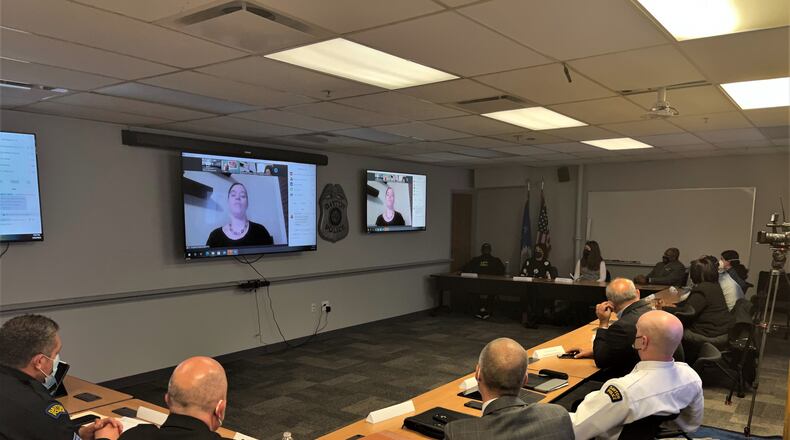But Dayton’s police and law departments do not want the language about necessity in the use-of-force policy because police officials say they believe it would create a new legal standard beyond established case law.
“It’s not that we think necessity is a bad term, but the way it’s defined, I think is way too vague and way too broad and we believe it creates a new legal standard,” said Dayton police Chief Kamran Afzal.
The Dayton City Commission will have to decide whether to make all or just some of the proposed policy changes.
Dayton’s Use of Force Committee recently met and approved sending a letter to the Dayton City Commission that says it fully supports the recommendations of a police reform working group.
The Use of Force Committee voted 4 to 2 to approve sending the letter to the commission.
A working group focused on police use of force issued 21 recommendations for changes to police department policies, practices and other considerations.
The group’s last meeting was in April 2021, but some of its recommendations still have not been approved by the city commission.
This includes proposals to add some new use-of-force prohibitions and modify the use-of-force policy to say police force should be necessary, proportional to the level of resistance or noncompliance and objectively reasonable given the totality of circumstances.
Dayton’s law department a few months ago released a draft of a new use-of-force policy that does not contain recommended language about necessity and some of the requested prohibitions.
On Sept. 20, the Use of Force Committee sent the city commission a letter that says the police and law departments did not offer evidence or data to support leaving out the working group’s recommended language in the draft policy.
The committee said police in many other cities, including Cleveland, Baltimore and South Bend, Ind., have use-of-force policies that say force must be necessary.
Cleveland saw reductions in both the number of incidents involving use of force and the number of officer injuries after the city approved a policy stating force must be necessary, proportional and objectively reasonable, the committee’s letter says.
City officials have not presented any evidence to suggest that the recommended “necessary” language could result in negative consequences for citizens, officers or municipalities, the committee said.
Police and law officials have pointed out that the police department’s rules of conduct already prohibit officers from using unnecessary force.
But the committee’s letter says that rules of conduct and police policy are different.
“Rules of conduct are applicable to internal discipline and do not provide the level of detail established by policy,” the letter states.
Policy has the potential to be considered in the courts when there is litigation, and potential municipal liability may be a legitimate concern, the committee’s letter states.
But policy cannot “supplant” existing legal standards, and the law department provided no evidence or data indicating the recommended standard would have an adverse impact on liability, the letter states.
The only way to achieve true meaningful change is through policy, said Wourms, with the committee.
There’s still plenty of police reform work left to do, but the city commission’s approval of the working group recommendations would be a major step forward, he said.
Dayton police do not use force in 99.8% of contacts with citizens, but officers sometimes have to make split-second decisions, some that potentially mean life or death, said police Chief Afzal.
He said it could be harmful to require officers to try to comply with a subjective requirement of “necessary” force.
The courts have said police force must be objectively reasonable, but different people may have different views about what is and is not necessary in various situations, especially when looking back after the fact, he said.
The necessity requirement is vague and could negatively impact how officers do their jobs and protect public safety, such as by making them second guess what actions to take in critical moments or situations, Afzal said.
“We want things to be instinctive,” he said. “We, at the local level, should not be creating a new standard.”
The Baltimore Police Department has a use-of-force policy that says force should be necessary, reasonable and proportional.
Force is considered necessary only when no reasonably effective alternative exists, said Lindsey Eldridge, director of public affairs and community outreach with the Baltimore Police Department.
The term was added through a consent decree process in which the U.S. Department of Justice had significant input in the development of the policy, she said.
The language about necessity goes beyond an objective reasonableness legal standard from a landmark U.S. Supreme Court case, Eldridge said.
Some police agencies are reluctant to have policies that are stricter than what the Constitution requires, she said.
Cleveland’s current use-of-force policy also was developed as a result of a consent decree.
About the Author


